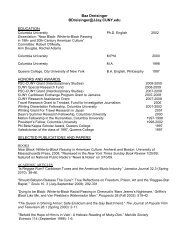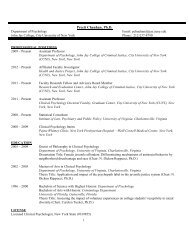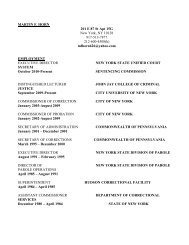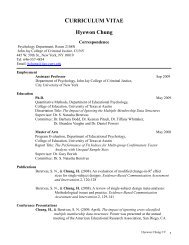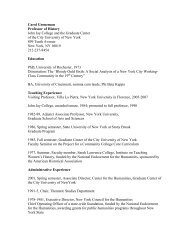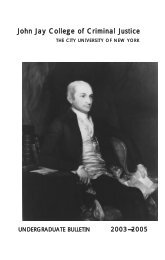- Page 1 and 2:
graduate undergraduate bulletin 201
- Page 3 and 4:
Contents 1 DEGREES OFFERED 1 9 FINA
- Page 5 and 6:
Degrees Offered REQUIREMENTS FOR BA
- Page 7 and 8:
Degrees Offered *Students must enro
- Page 9 and 10:
Degrees Offered Please note: ENG 10
- Page 11 and 12:
Degrees Offered CORRECTIONAL STUDIE
- Page 13 and 14:
Degrees Offered Law 310/Philosophy
- Page 15 and 16:
Degrees Offered Additional informat
- Page 17 and 18:
Degrees Offered PART TWO. MANAGEMEN
- Page 19 and 20:
Degrees Offered 431) or a research
- Page 21 and 22:
Degrees Offered Likewise, some 200-
- Page 23 and 24:
Degrees Offered Credits PART ONE. E
- Page 25 and 26:
Degrees Offered Literature 340/Afri
- Page 27 and 28:
Degrees Offered FORENSIC PSYCHOLOGY
- Page 29 and 30:
Degrees Offered Credits required. 7
- Page 31 and 32:
Degrees Offered Gender Studies 364/
- Page 33 and 34:
Degrees Offered PART THREE. Chronol
- Page 35 and 36:
Degrees Offered Category A. History
- Page 37 and 38:
Degrees Offered Police Science 415
- Page 39 and 40:
Degrees Offered Coordinator. Profes
- Page 41 and 42:
Degrees Offered Category D. Urban P
- Page 43 and 44:
Degrees Offered Department of Psych
- Page 45 and 46:
Degrees Offered PART FOUR. SENIOR S
- Page 47 and 48:
Degrees Offered DEGREES AWARDED BY
- Page 49 and 50:
Courses Offered Counseling CSL SEEK
- Page 51 and 52:
Courses Offered professions. Studen
- Page 53 and 54:
Courses Offered AAH 275 African-Ame
- Page 55 and 56:
Courses Offered AAP 240 Psychology
- Page 57 and 58:
Courses Offered ANT 212 Applied Ant
- Page 59 and 60:
Courses Offered immigrant as psychi
- Page 61 and 62:
Courses Offered ART 201 Art and Arc
- Page 63 and 64:
Courses Offered must be completed i
- Page 65 and 66:
Courses Offered chemistry, or who r
- Page 67 and 68:
Courses Offered CHINESE (Department
- Page 69 and 70:
Courses Offered COR 230 Sex Offende
- Page 71 and 72:
Courses Offered demands human servi
- Page 73 and 74:
Courses Offered changing roles and
- Page 75 and 76:
Courses Offered DRA 110 Introductio
- Page 77 and 78:
Courses Offered DRA 245 Women in Th
- Page 79 and 80:
Courses Offered ECO 235 Finance for
- Page 81 and 82:
Courses Offered crime, corruption,
- Page 83 and 84:
Courses Offered ENG 255 Argument Wr
- Page 85 and 86:
Courses Offered cultural diversity
- Page 87 and 88:
Courses Offered FIS 330 Building Co
- Page 89 and 90:
Courses Offered GENDER STUDIES (see
- Page 91 and 92:
Courses Offered HIS 202 American Ci
- Page 93 and 94:
Courses Offered HIS 231 The Origins
- Page 95 and 96:
Courses Offered HIS 265 Class, Race
- Page 97 and 98:
Courses Offered HIS 361 Ancient Egy
- Page 99 and 100:
Courses Offered to questions posed
- Page 101 and 102:
Courses Offered INTERNATIONAL CRIMI
- Page 103 and 104:
Courses Offered LLS 145 Puerto Rica
- Page 105 and 106:
Courses Offered LLS 260 History of
- Page 107 and 108:
Courses Offered seek justice and re
- Page 109 and 110:
Courses Offered LAW 245 Immigration
- Page 111 and 112:
Courses Offered LAW 420 Contemporar
- Page 113 and 114:
Courses Offered LIT 284 Film and So
- Page 115 and 116:
Courses Offered LIT 319 Law and Jus
- Page 117 and 118:
Courses Offered slave era, legacies
- Page 119 and 120:
Courses Offered LIT 374 Topics in N
- Page 121 and 122:
Courses Offered MAT 204 Discrete St
- Page 123 and 124:
Courses Offered MAT 278 Software Ap
- Page 125 and 126:
Courses Offered and congestion cont
- Page 127 and 128:
Courses Offered MUS 202 Composition
- Page 129 and 130:
Courses Offered PHI 203 Political P
- Page 131 and 132:
Courses Offered PHI 322 Judicial an
- Page 133 and 134:
Courses Offered comprehensive fitne
- Page 135 and 136:
Courses Offered restriction on the
- Page 137 and 138:
Courses Offered PSC 201 Police Orga
- Page 139 and 140:
Courses Offered prosecuting attorne
- Page 141 and 142:
Courses Offered Prerequisites: ENG
- Page 143 and 144:
Courses Offered POL 257 Comparative
- Page 145 and 146:
Courses Offered 259/LAW 259/POL 259
- Page 147 and 148:
Courses Offered various subfields o
- Page 149 and 150:
Courses Offered courtship, cohabita
- Page 151 and 152:
Courses Offered PSY 243 Theories of
- Page 153 and 154:
Courses Offered PSY 343 Psychology
- Page 155 and 156:
Courses Offered PSY 477 Advanced Se
- Page 157 and 158:
Courses Offered power; governmental
- Page 159 and 160:
Courses Offered RUS 114 Russian for
- Page 161 and 162:
Courses Offered and personnel are e
- Page 163 and 164:
Courses Offered SOCIAL SCIENCE RESE
- Page 165 and 166:
Courses Offered SOC 215 Social Cont
- Page 167 and 168:
Courses Offered theories explaining
- Page 169 and 170:
Courses Offered SOC 410 Independent
- Page 171 and 172:
Courses Offered Students who take S
- Page 173 and 174:
Courses Offered SPA 332 Introductio
- Page 175 and 176:
Courses Offered TOXICOLOGY (Departm
- Page 177 and 178:
Certificates, Programs and Minors P
- Page 179 and 180:
Certificates, Programs and Minors L
- Page 181 and 182:
Certificates, Programs and Minors 8
- Page 183 and 184:
Certificates, Programs and Minors A
- Page 185 and 186:
Certificates, Programs and Minors R
- Page 187 and 188:
Certificates, Programs and Minors s
- Page 189 and 190:
Certificates, Programs and Minors R
- Page 191 and 192:
Certificates, Programs and Minors p
- Page 193 and 194:
Certificates, Programs and Minors A
- Page 195 and 196:
Certificates, Programs and Minors C
- Page 197 and 198:
Certificates, Programs and Minors S
- Page 199 and 200:
Certificates, Programs and Minors L
- Page 201 and 202:
Certificates, Programs and Minors 3
- Page 203 and 204:
Certificates, Programs and Minors p
- Page 205 and 206:
Certificates, Programs and Minors R
- Page 207 and 208:
Certificates, Programs and Minors M
- Page 209 and 210:
Certificates, Programs and Minors R
- Page 211 and 212:
Academic Resources Consultants are
- Page 213 and 214:
Academic Resources In addition to i
- Page 215 and 216:
5 Admissions and Registration The C
- Page 217 and 218:
Admissions and Registration Public
- Page 219 and 220:
Admissions and Registration Police,
- Page 221 and 222:
Admissions and Registration • New
- Page 223 and 224:
Admissions and Registration credit
- Page 225 and 226:
Academic Standards Note: English 10
- Page 227 and 228:
Academic Standards All notification
- Page 229 and 230:
Academic Standards * An F is not er
- Page 231 and 232:
Academic Standards Appeal for Chang
- Page 233 and 234:
Academic Standards interview which
- Page 235 and 236:
Academic Honors, Awards & Special O
- Page 237 and 238:
Academic Honors, Awards & Special O
- Page 239 and 240:
Academic Honors, Awards & Special O
- Page 241 and 242:
TUITION & FEES Administrative Cance
- Page 243 and 244:
TUITION & FEES FEES Consolidated Fe
- Page 245 and 246:
FINANCIAL AID APPLICATION PROCEDURE
- Page 247 and 248:
FINANCIAL AID months of educational
- Page 249 and 250:
FINANCIAL AID for their dependent u
- Page 251 and 252:
FINANCIAL AID FIRST-TIME UNDERGRADU
- Page 253 and 254:
10 Student Life STUDENT LIFE Studen
- Page 255 and 256: Student Life Medical Emergencies Co
- Page 257 and 258: Student Life • Allows students to
- Page 259 and 260: Student Life Eligibility criteria f
- Page 261 and 262: Student Life workshops at regional
- Page 263 and 264: Academic Departments Professors Eme
- Page 265 and 266: Academic Departments (Sociology), C
- Page 267 and 268: Academic Departments DEPARTMENT OF
- Page 269 and 270: Academic Departments Coordinator of
- Page 271 and 272: General GRADUATE AND UNDERGRADUATE
- Page 273 and 274: JOHN JAY COLLEGE OF CRIMINAL Genera
- Page 275 and 276: Faculty & Staff VICTORIA ABBOTT-PIT
- Page 277 and 278: Faculty & Staff ANTHONY CARPI Profe
- Page 279 and 280: Faculty & Staff JAMES DI GIOVANNA A
- Page 281 and 282: Faculty & Staff DOLORES GRANDE Assi
- Page 283 and 284: Faculty & Staff LAWRENCE J. KAPLAN
- Page 285 and 286: Faculty & Staff LOUIS LIEBERMAN Pro
- Page 287 and 288: Faculty & Staff LORRAINE F. MOLLER
- Page 289 and 290: Faculty & Staff ALLISON PEASE Assoc
- Page 291 and 292: Faculty & Staff CARIDAD SANCHEZ Ass
- Page 293 and 294: Faculty & Staff MARGARET MIKESELL T
- Page 295 and 296: Faculty & Staff MARVIN YABLON Profe
- Page 297 and 298: APPENDIX institution’s instructio
- Page 299 and 300: APPENDIX she may have missed becaus
- Page 301 and 302: APPENDIX Informal Complaint Procedu
- Page 303 and 304: APPENDIX shall, solely by reason of
- Page 305: APPENDIX 2. Attendance at an execut
- Page 309 and 310: APPENDIX The faculty member and the
- Page 311 and 312: APPENDIX When the form is submitted
- Page 313 and 314: APPENDIX Plagiarism is the act of p
- Page 315 and 316: APPENDIX Accordingly, these procedu
- Page 317 and 318: APPENDIX • You may not circumvent
- Page 319 and 320: APPENDIX witness to such suspected
- Page 321 and 322: APPENDIX develop workplace violence
- Page 323 and 324: APPENDIX II. Financial Assistance A
- Page 325 and 326: APPENDIX FEDERAL DISCLOSURE REQUIRE
- Page 327 and 328: APPENDIX with CUNY bylaws, the Prof
- Page 329 and 330: APPENDIX CHARTER OF THE STUDENT GOV
- Page 331 and 332: APPENDIX Section 5 - Procedures and
- Page 333 and 334: APPENDIX B. The members of the Stud
- Page 335 and 336: APPENDIX administration and perform
- Page 337 and 338: APPENDIX time of their appointment
- Page 339 and 340: APPENDIX date and times of the elec
- Page 341 and 342: APPENDIX C. If two-thirds of the qu
- Page 343 and 344: Index remedial and developmental co
- Page 345 and 346: Index Freedom of Information Notice
- Page 347 and 348: Index Political science, courses, 1



